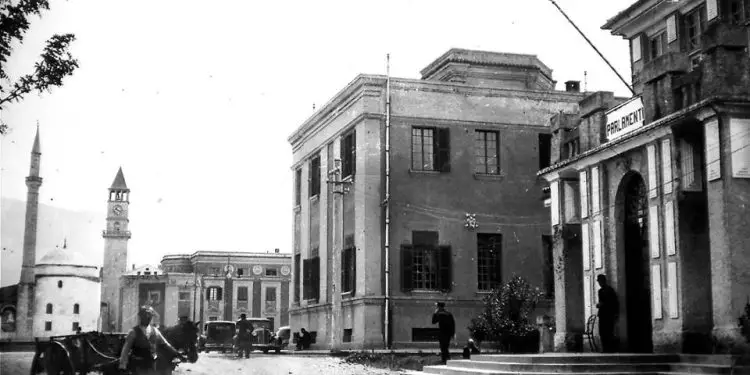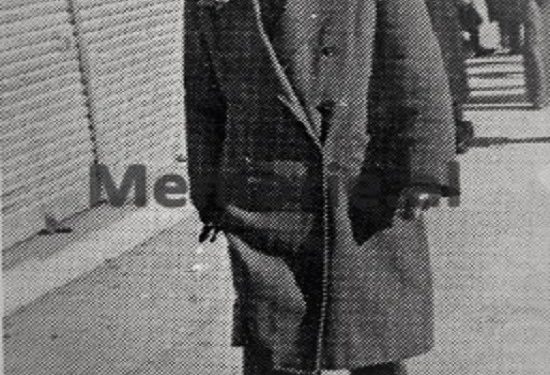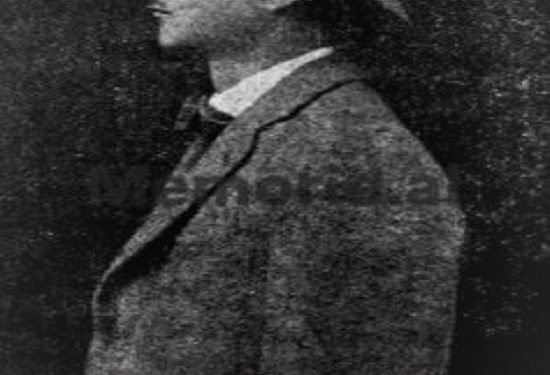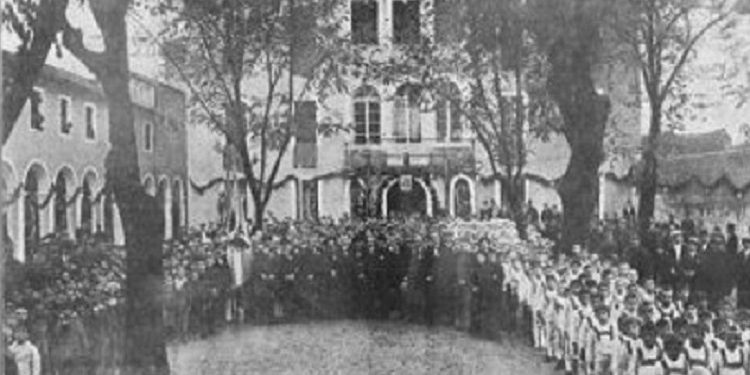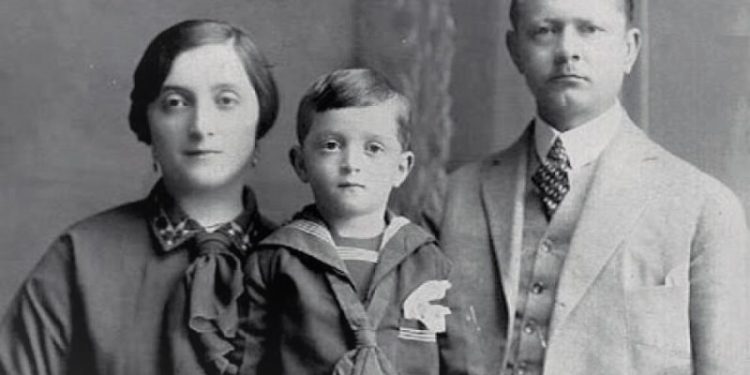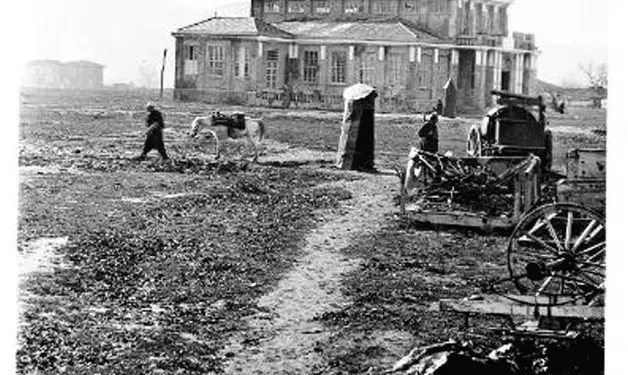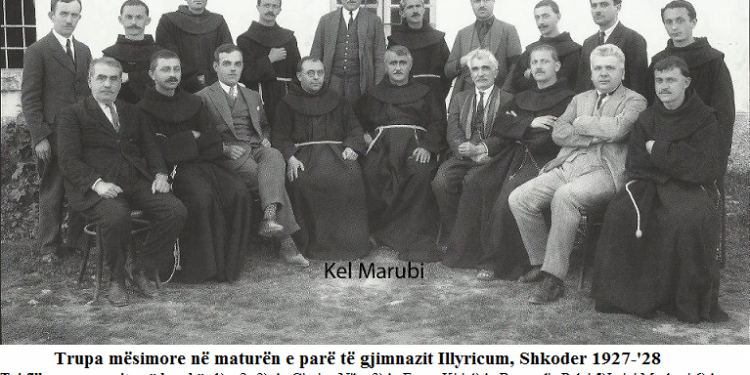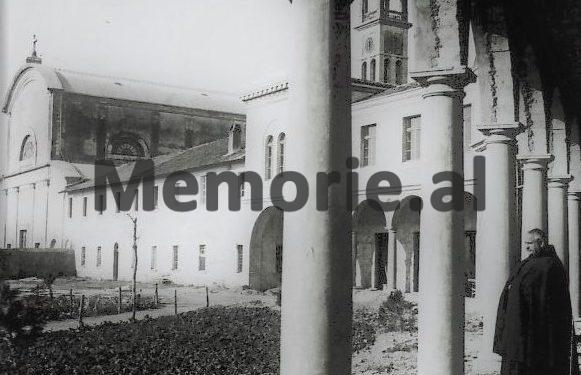By Sven Aurén
Translated by Adil N. Bicaku
Part Sixteen
ORIENTI EUROPE
Land of Albania! Let me bend my eyes
On thee, thou rugged nurse of savage men.
Lord Byron.
In the book “Orient of Europe”, the author of the work is the Swede Sven Aurén. They are impressions of traveling from Albania from the ‘30s. His direct experiences without any retouching.
In a word, the translation of the book will bring to the Albanian reader, the original value of knowing that story that we have not known and we continue to know it, and now distorted by the interests of the moment.
Now a little about what these lines address to you: My name is Adil Bicaku. I have worked and lived for over 50 years in Sweden, without detaching for a moment, the thought and feeling from our Albania.
I am now retired and living with my wife and children, here in Stockholm. Having been for a long time, from the evolution of the Albanian language, which naturally happened during these decades, I am aware of the difficulties, not small, that I will face, to give the Albanian reader, the experiences of the original.
Therefore, I would be very grateful if we could find a practical way of cooperation together, to translate this book with multifaceted values.
Morally, I would feel very relieved, paying off part of the debt that all of us Albanians owe to our Albania, especially in these times that continue to be so turbulent.
With much respect
Adil Biçaku
Continued from the previous issue
This pacification, which I mentioned, has had the task of creating calm and comfort for the residents themselves, stopping blood feuds and strengthening the central government of the government. As a result of this pacification, there are a number of reforms in favor of the country. Based on the general military service, we have set up an army and the mobilized number of men now reaches 70-80,000. The peacekeeping force contains about 12,000, the time of military service plays from 6 months to 2 years, depending on the internal and external situation. For economic reasons we have shifted part of the military training to schools, where the youth are taught by officers.
In those villages and provinces, which lack schools, specially commanded officers and non-commissioned officers are trained 2 or 3 times a week. The youth who receive and should participate in these exercises are aged 15-20 years. After completing the course, we call it a “paramilitary course”, the boys are given a certificate. When they reach the age of 21, they report to the Annual Recruitment Registry. Out of a hundred boys, only twenty are selected and they are the ones who have the worst record. Others escape military service or are trained as reserve officers, now numbering up to 1,600.
-You talk about places that lack schools.
-Think a little now. You say it in a tone, as if it were very strange, that we could not prepare school opportunities, in every one of the many villages of Albania. It is really important that our schooling has had such a good start. You know, that the Turkish regime did as much as it could to prevent education. As late as 1912, with the exception of a number of religious schools (where, as a rule, there was more political propaganda than teaching), we could hardly talk about an Albanian school service. During the turbulent years until the founding of the Monarchy… of a unique school organization.
Take e.g. in 1920. What was the share of the Albanian population, do you believe, that he could read and write at that time? 10 percent! Today, the illiteracy rate has dropped to 40 percent. This is an important change. We have 577 popular, five-grade schools spread across the country and over a thousand teachers. The number of secondary schools reaches 20, there 6 gymnasiums, 5 Pedagogical schools and the rest Agricultural schools, Technical schools and Commercial schools.
Through vacancies and scholarships we seek to prepare a layer of intelligence, in the service of society that will be recruited regardless of the economic situation of the parents. But what we do not have is the university and the high schools. For such studies we have to take our young people abroad. The older generation studied in general, in the universities of Constantinople, this young man went to Austria, France, England, Italy and America. Right now, we have about four hundred students scattered in foreign universities and a large part of them study entirely at the expense of the Albanian state.
-And those schools, which are held by different religious associations?
-They are entrepreneurs entirely from the state this year. We do not allow private schooling, from now on. For a very long time, we have been able to see how they are being abused for political purposes. I do not want to deny that Shkodra, thanks to the Catholic influence, has long played the role of an intellectual oasis, in the desert of Albanian culture. The Jesuit Gymnasium, with which a priestly seminary was connected, had a great name in the international arena a hundred years ago. The Franciscan Gymnasium and the girls ‘and girls’ school for teachers have also maintained a high standard. We have now taken over these school institutions ourselves and hope to manage them educationally, just as effectively but politically, in a more patriotic way. We want to shape our own youth. That may not seem like a big deal, does it? This is the first right of a state.
But these eight years of reforms do not remain with what has been done for the Army and the education of the people. From all the roads of the country, you have not seen so far more than the line Durrës – Tirana. You yourself will be convinced why, the excellent character of this road, is typical for the main roads as a whole. In recent years, more roads have been built in Albania than in any other Balkan country. The serpentine between Tirana and Elbasan is a masterpiece of engineering art. 400 bridges have been erected at important points. And the construction of these roads, has resulted, that bus traffic, has received tremendous development. You can currently travel wherever you want, instead of the regular bus route.
Just ten years ago, a ten-mile journey was a dangerous activity, requiring detailed and lengthy planning. I do not need to emphasize what the improvement of the road system meant for the upliftment of life and internal trade. Or what we hope, that in our country, this will have for a foreign tourism. As far as economic opportunity allowed, the people also bought private cars. Over 2,000 cars have been registered, so far and the mayor of Tirana, Mr. Jella, is the president of the Albanian Automobile Club, which in fact, still has a very modest number of members, but by human judgment, there should be great opportunities for development.
Let’s look at another side, but many important parts of the social organization, namely the Justice system, you will find, that it has a very modern structure. The country’s civil administration is divided into 10 prefectures and 31 sub-prefectures. In every sub-prefecture, there is a Civil Court, in every prefecture, a High Court which serves as a dictation court, as the first instance in those cases where disputes amount to over 2,500 gold francs. The Supreme Court is located in Tirana. The organization of the Supreme Court is from 1929. Our ‘Civil Law’, which also comes from 1929, is according to that of the Italian, French and Swiss model of Justice and our Criminal Justice, according to the Italian ‘Criminal Code’. The Commercial Code is from a later date: 1932. This too was designed according to the Italian example. You can probably guess how difficult it was for us to put this hypermodern justice system into use.
The mountain tribes are from many past gene-rations, accustomed to two kinds of justice: Turkish justice and that of the customs of the domestic justice of the country, of which at least, the latter is one of the most extraordinary for its strong character, of preservation and in many fundamental principles and views, differs completely from modern justice. As much as the old Turkish justice, it has much in common with the appearance of the new time, of legal problems. We have, therefore, been forced to confront the people, with something absolutely new, something that the heir of generations has turned upside down, of understanding what is right and wrong. We did not even have a body of competent judges with long experience in the implementation of this new organization of Justice. In this view, we are still in a transitional period, but we do our best to meet our need for educated lawyers.
I do not want to bother you with details that have to do with what we have and what we do in the economic sector. However what they say in the opposite direction, Albania is an agree-cultural state or at least, a future agree-cultural state. Foreigners, who come to our country, even find it difficult to understand this. They focus mainly on our beautiful and rugged mountains and say: “By God, what do the people live on”?! It is true, that we have many mountains, perhaps too many. The plains make up only a quarter of the entire surface of the country. But this, a quarter, has not been exploited in any way, as it should have been.
Foreign experts have calculated that the country would feed four to four times more population, and so on and so forth, had the opportunity to export. Other than that, those three-quarters mountains are not worthless. Approximately 15 percent consist of bare rocks and mountain peaks, but the rest is very suitable, for livestock and forestry. You have to understand, then, that we have a number of possibilities. We are allowed to live in peace; it will not last long, because this one million Albanians, living in their homeland, will be able to work, up to a worthy human standard.
What is the government doing now, to seek to give life to the economy? It does more than you believe. She propagates through farmers the best and most modern working methods, the use of labor-saving machines, the replacement of the plow, with the tools for that purpose. She has established agricultural schools, with and under expert guidance, where rural youth learn what modern effectiveness means. In all ways, it seeks to educate the people, to use the main fruit, the corn, for fodder purposes rather than for cooking, and distributed for years, large quantities of Italian wheat, to increase wheat production.
Our olive culture contains 1,500,000 roots. The government has set up a state inspection, which takes care that the cultivation of olives is done in a rational way, helps to fight the olive fly, etc. Olive is our major export item. But so far, we have exported only olives, no oil at all. We are aware that a large part of our olives are re-exported to Albania in the form of oil. We have now put into operation two refineries in Elbasan. There are great opportunities here. A good year of production, we can export up to 4,000,000 kg. Olives, but the oil has approximately, ten times the value, than the corresponding weight of the raw material.
By distributing state tobacco experts to each prefecture and supporting them, in various ways, we have sought to intensify, as well as the country’s tobacco product. In state testing facilities, different assortments of tobacco are experimented, which are more suitable for our climate. Four years ago, we exported for about 260,000 gold francs. In recent years, exports to some extent, has gone down, but how could Albania, the only country in Europe, to be able to keep the global crisis, abroad? Personally, I am convinced that our tobacco can be developed into a large export item. You yourself can be convinced that it is of good quality.
In our mountains and hills, two and a half million sheep and a million and a half goats graze, so I should not surprise you that almost half of our exports consist of the products of this cattle breeding. First of all is the cheese. Especially in the USA, Albanian types of cheese are highly valued, but Italy also buys a lot. Through more rational methods of slaughter and better care, for animals these branches of the economy should be able to get development, more important. Through the establishment of agricultural models and the education of skilled veterinarians, the government is working for an improvement. In the same way it aimed to intensify Albanian fishing, which has a great spread and origins from the time of the Venetians. 200,000 trees have been distributed free of charge, to inform the people about the possibilities, who until now, had a very vague opinion about the trees.
Through loans and advice, the state will further help the country’s industry, which now employs approximately thousands of workers and mainly processes its own products. We have several distinguished mills, a number of alcohol factories, oil refineries, soap factories, cigarette factories. We also have cement-cardboard-and-cellulose factory and a good power plant. And first of all, we have a wonderful home industry. Albanian farmers have always been forced to process most of the things they need. It follows that handicrafts have reached a great development, and not a little textile handicrafts, presents a high distinctive standard.
Take a visit to any of our weekly shopping! You will be amazed at the beauty and the many colors, in those fabrics and woven clothes at home that are offered at reasonable prices. Or go inside one of the many jewelry stores in Tirana and study with what excellent craftsmanship those craftsmen process the watermarks. There are many handicraft masters in the Balkan countries. Albania is not behind its neighbors. Take a look at one of these gold embroidered overcoats, which Albanian girls give to future men and which they embroider with patterns and braids, from the most wonderful.
These are items of masters, which attract distant buyers, to decide to make their trips to Albania. We usually use them as decorations on the walls and they always arouse the same admiration. This industry of the country is also encouraged by the government, which sees it with enthusiasm, that to some extent it should be industrialized a lot to give the country opportunities for economic growth.
-Yes, the Albanian state has done a lot for a short period of eight years, ends Eqrem Vlora. I could tell you even more, about new hospitals, about city-building activity, about the increasing liveliness of the press, but that is enough. You can, with your own eyes, verify my assertions. I do not want to exaggerate our works, but I want to say that we have opened a window to time. Until eight years ago, this window was absolutely closed. Albania lived in the specific backward, isolated medieval. Winds of freshness are now blowing over our country.
He takes a deep breath of the cigarette and skillfully, exhales a row of smoke in the form of circles of different sizes, who believed, that together they would form the word: PROGRESS.
-I’m naturally impressed, I tell him. You have talked about disarming and building an army, ready for battle, building magnificent roads, over schools, emerging like mushrooms from the ground, over the regulation of new justice, new methods of land use, new model constructions, an increase of the intellectual elite. I am naturally impressed. But tell me one thing. Tell me: where did Albania get this money for all these reforms?
Eqrem Vlora does not seem satisfied with this question. He sits silent a piece of time and looks thoughtfully, over the garden coffee audience. Then he says:
-You know the situation of the end of the World War, when the settlement would be created, for the situation of the confused borders of the Balkans. New states would see the light, old ones fell. The Balkans would get a new map. The Balkan states in the difficulties of the beginning were protected by the loving mother, only the stepmother lottery fell to Albania. Where would we get funding for these large construction jobs? The superpowers did not have much desire to invest first in a poor mountainous country, which was seen to be inhabited by uncultivated street thieves. All states were told: no to our loan polls. All but one: Italy. We had to take money, where we could get it.
-And they did not put Albania in a dangerous dependence, these Italian loans?
He looks at me:
-No! He says loudly and loudly.
And as this great patriotic lie ripples over the garden tables and perhaps some stranger, will turn his head from our side, he gets up greets: ‘good track’ and disappears. I see him rushing down the street, to the edge of the Parliament building.
The Parliament building is located right next door: a small one-story building painted yellow. Above the entrance shines the word “Parliament” in large letters. The notice appears. Otherwise, foreigners could easily get Parliament for a shooting pavilion.
I know that an American visiting Tirana, who at the first sight of the Parliament building, fell into a kind of spasm of laughter, so much so that he is forced to go to the hotel and lie in bed. But why is it now necessary to laugh contemptuously at modest proportions? Is it not at all right that the Parliament of a dictatorial state has a simple external appearance? Albania is not alone in this situation. Look at the parliaments, at the ancient gentlemen of the country! Ankara is a very modern city, with functional palaces, incredibly beautiful parks and magnificent monuments. But even the Turkish parliament would need an inscription above the gate.
It looks like our state hotel, in one of the cities of a small province. Memorie.al




